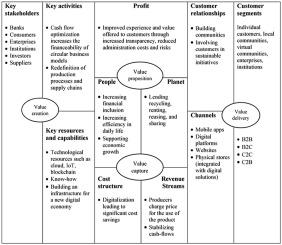当前位置:
X-MOL 学术
›
J. Clean. Prod.
›
论文详情
Our official English website, www.x-mol.net, welcomes your
feedback! (Note: you will need to create a separate account there.)
Fintech and SMEs sustainable business models: Reflections and considerations for a circular economy
Journal of Cleaner Production ( IF 9.7 ) Pub Date : 2020-11-19 , DOI: 10.1016/j.jclepro.2020.125217 Simone Pizzi , Leonardo Corbo , Andrea Caputo
Journal of Cleaner Production ( IF 9.7 ) Pub Date : 2020-11-19 , DOI: 10.1016/j.jclepro.2020.125217 Simone Pizzi , Leonardo Corbo , Andrea Caputo

|
Following the operational paradigms proposed by Industry 4.0, the last years have been characterized by the rapid growth of technology-based firms increasingly adopting sustainable business models. In particular, an increasing number of Fintech enterprises have started to launch new services in order to avoid the organizational barriers that impact negatively on the voluntary adoption of sustainable business models by SMEs. However, research is still scarce in systematizing the efforts and identifying the facilitating factors for such a transition. Drawing on a diverse set of companies, case studies linking Fintech application and circular economy (CE) in diverse industries and contexts are analyzed and discussed. The findings of the qualitative analysis suggest that Fintech, an example of sectors developed under the influence of Industry 4.0, can play a relevant role in the transition of SMEs toward a more sustainable business model leading to better integration of circular economy practices. A conceptual framework using the ReSOLVE model is then presented with relevant implications for both research and practice.
中文翻译:

金融科技与中小企业可持续商业模式:循环经济的思考与思考
遵循工业 4.0 提出的运营范式,过去几年的特点是技术型企业的快速增长,越来越多地采用可持续的商业模式。特别是,越来越多的金融科技企业开始推出新服务,以避免组织障碍对中小企业自愿采用可持续商业模式产生负面影响。然而,在系统化这些努力和确定这种转变的促进因素方面的研究仍然很少。借鉴不同的公司,分析和讨论了在不同行业和背景下将金融科技应用和循环经济(CE)联系起来的案例研究。定性分析的结果表明,金融科技作为在工业 4.0 影响下发展的行业的一个例子,可以在中小企业向更可持续的商业模式转型中发挥相关作用,从而更好地整合循环经济实践。然后提出使用 ReSOLVE 模型的概念框架,并对研究和实践产生相关影响。
更新日期:2020-11-19
中文翻译:

金融科技与中小企业可持续商业模式:循环经济的思考与思考
遵循工业 4.0 提出的运营范式,过去几年的特点是技术型企业的快速增长,越来越多地采用可持续的商业模式。特别是,越来越多的金融科技企业开始推出新服务,以避免组织障碍对中小企业自愿采用可持续商业模式产生负面影响。然而,在系统化这些努力和确定这种转变的促进因素方面的研究仍然很少。借鉴不同的公司,分析和讨论了在不同行业和背景下将金融科技应用和循环经济(CE)联系起来的案例研究。定性分析的结果表明,金融科技作为在工业 4.0 影响下发展的行业的一个例子,可以在中小企业向更可持续的商业模式转型中发挥相关作用,从而更好地整合循环经济实践。然后提出使用 ReSOLVE 模型的概念框架,并对研究和实践产生相关影响。











































 京公网安备 11010802027423号
京公网安备 11010802027423号